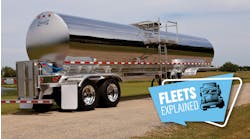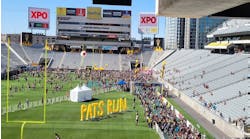When Daniel C. Ustian was named CEO of Navistar International Corp. last December, he said one of his goals was to grow the business. This week, Navistar's International Truck and Engine Corp. did just that.
Navistar announced that its International Truck and Engine Corp. subsidiary establishd a business unit that will compete for U.S. military contracts. The unnamed unit will leverage existing medium truck and parts platforms as well as International’s line of diesel engines.
"Daniel Ustian is focusing on new growth opportunities as his number-one priority, and he sees this as an excellent growth opportunity for International," company spokesman Roy Wiley told Fleet Owner. "He's going to pursue it vigorously."
Wiley said military sales are a natural area of growth for International, and added that the company already produces platforms the U.S. military and those of other NATO countries could leverage for products and services.
"The contract procedure with the military takes time," Wiley said. "I think they will look at us based on what we do with medium-duty trucks."
Analyst Martin Labbe of Ormond Beach, FL-based Martin Labbe Associates said that International's applications for the military could easily extend beyond medium-duty trucks.
"International has a heavy-duty product line that blends with military applications," Labbe told Fleet Owner. "There's no reason they cannot be successful selling to the military."
Labbe noted the military has moved away from purchasing equipment that was made specifically for it. For example, a Class 6 straight truck has wider use than a classic Deuce and a Half military-spec vehicle, which the military found didn't have much mobility and was expensive to build.
"If the military sees the need for Class 8 trucks down the road, we'll pursue it," Wiley added.
Labbe said he can understand why International felt the need to start a separate unit for military contracts, even though the company has made military sales in the past. He agreed that if any OEM could successfully enter the military market, it is International.
"Any time you deal with the government you need to have specialized people in the process," Labbe said. "It is a big effort for International, but not as big as it would have to be for other OEMs."


